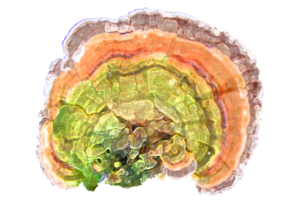Ho CY, Kim CF, Leung KN, Fung KP, Tse TF, Chan H, Lau CB
Abstract
Coriolus versicolor (CV), also called Yunzhi, has been demonstrated to exert anti-tumor effects on various types of cancer cells. Our previous studies have demonstrated that a standardized aqueous ethanol extract prepared from CV inhibited the proliferation of human leukemia cells via induction of apoptosis. The present study aimed to evaluate the underlying mechanisms of apoptosis through modulation of Bax, Bcl-2 and cytochrome c protein expressions in a human pro-myelocytic leukemia (HL-60) cell line, as well as the potential of the CV extract as anti-leukemia agent using the athymic mouse xenograft model. Our results demonstrated that the CV extract dose-dependently suppressed the proliferation of HL-60 cells (IC50 = 150.6 microg/ml), with increased nucleosome production from apoptotic cells. Expression of pro-apoptotic protein Bax was significantly up-regulated in HL-60 cells treated with the CV extract, especially after 16 and 24 h. Meanwhile, expression of anti-apoptotic protein Bcl-2 was concomitantly down-regulated, as reflected by the increased Bax/Bcl-2 ratio. The CV extract markedly, but transiently, promoted the release of cytochrome c from mitochondria to cytosol after 24-h incubation. In vivo studies in the athymic nude mouse xenograft model also confirmed the growth-inhibitory activity of the CV extract on human leukemia cells. In conclusion, the CV extract attenuated the human leukemia cell proliferation in vivo, and in vitro possibly by inducing apoptosis through the mitochondrial pathway. The CV extract is likely to be valuable for the treatment of some forms of human leukemia.
Reference:
Oncol Rep. 2006 Sep;16(3):609-16

